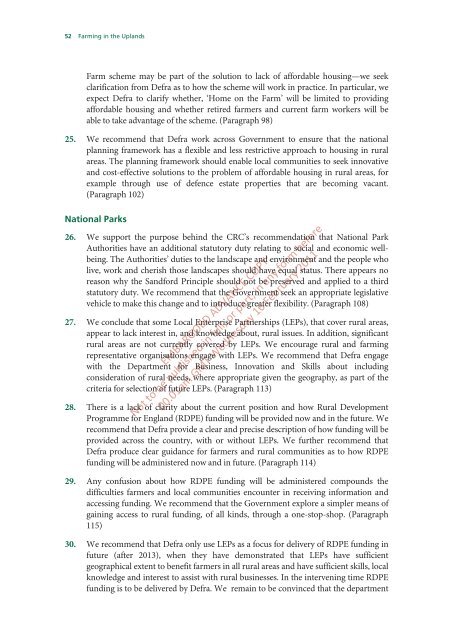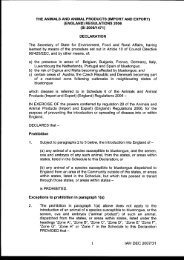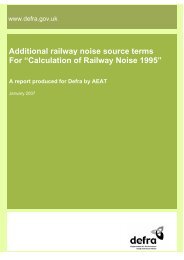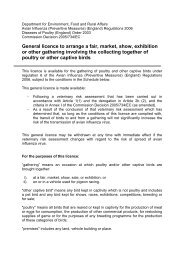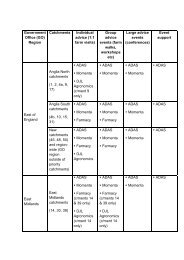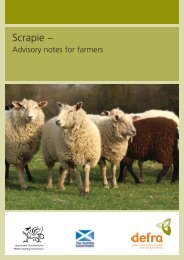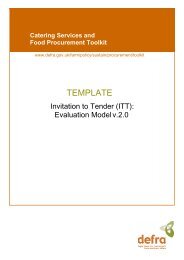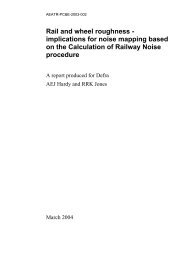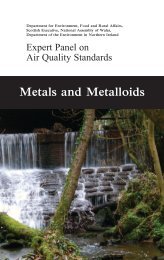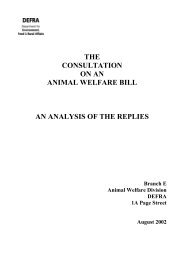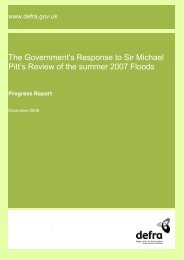Farming in the Uplands - ARCHIVE: Defra
Farming in the Uplands - ARCHIVE: Defra
Farming in the Uplands - ARCHIVE: Defra
You also want an ePaper? Increase the reach of your titles
YUMPU automatically turns print PDFs into web optimized ePapers that Google loves.
52 <strong>Farm<strong>in</strong>g</strong> <strong>in</strong> <strong>the</strong> <strong>Uplands</strong><br />
Farm scheme may be part of <strong>the</strong> solution to lack of affordable hous<strong>in</strong>g—we seek<br />
clarification from <strong>Defra</strong> as to how <strong>the</strong> scheme will work <strong>in</strong> practice. In particular, we<br />
expect <strong>Defra</strong> to clarify whe<strong>the</strong>r, ‘Home on <strong>the</strong> Farm’ will be limited to provid<strong>in</strong>g<br />
affordable hous<strong>in</strong>g and whe<strong>the</strong>r retired farmers and current farm workers will be<br />
able to take advantage of <strong>the</strong> scheme. (Paragraph 98)<br />
25. We recommend that <strong>Defra</strong> work across Government to ensure that <strong>the</strong> national<br />
plann<strong>in</strong>g framework has a flexible and less restrictive approach to hous<strong>in</strong>g <strong>in</strong> rural<br />
areas. The plann<strong>in</strong>g framework should enable local communities to seek <strong>in</strong>novative<br />
and cost-effective solutions to <strong>the</strong> problem of affordable hous<strong>in</strong>g <strong>in</strong> rural areas, for<br />
example through use of defence estate properties that are becom<strong>in</strong>g vacant.<br />
(Paragraph 102)<br />
National Parks<br />
26. We support <strong>the</strong> purpose beh<strong>in</strong>d <strong>the</strong> CRC’s recommendation that National Park<br />
Authorities have an additional statutory duty relat<strong>in</strong>g to social and economic wellbe<strong>in</strong>g.<br />
The Authorities’ duties to <strong>the</strong> landscape and environment and <strong>the</strong> people who<br />
live, work and cherish those landscapes should have equal status. There appears no<br />
reason why <strong>the</strong> Sandford Pr<strong>in</strong>ciple should not be preserved and applied to a third<br />
statutory duty. We recommend that <strong>the</strong> Government seek an appropriate legislative<br />
vehicle to make this change and to <strong>in</strong>troduce greater flexibility. (Paragraph 108)<br />
27. We conclude that some Local Enterprise Partnerships (LEPs), that cover rural areas,<br />
appear to lack <strong>in</strong>terest <strong>in</strong>, and knowledge about, rural issues. In addition, significant<br />
rural areas are not currently covered by LEPs. We encourage rural and farm<strong>in</strong>g<br />
representative organisations engage with LEPs. We recommend that <strong>Defra</strong> engage<br />
with <strong>the</strong> Department for Bus<strong>in</strong>ess, Innovation and Skills about <strong>in</strong>clud<strong>in</strong>g<br />
consideration of rural needs, where appropriate given <strong>the</strong> geography, as part of <strong>the</strong><br />
criteria for selection of future LEPs. (Paragraph 113)<br />
EMBARGOED ADVANCE COPY:<br />
Not to be published <strong>in</strong> full, or part, <strong>in</strong> any form before<br />
00.01am GMT Wednesday 16 February 2011<br />
28. There is a lack of clarity about <strong>the</strong> current position and how Rural Development<br />
Programme for England (RDPE) fund<strong>in</strong>g will be provided now and <strong>in</strong> <strong>the</strong> future. We<br />
recommend that <strong>Defra</strong> provide a clear and precise description of how fund<strong>in</strong>g will be<br />
provided across <strong>the</strong> country, with or without LEPs. We fur<strong>the</strong>r recommend that<br />
<strong>Defra</strong> produce clear guidance for farmers and rural communities as to how RDPE<br />
fund<strong>in</strong>g will be adm<strong>in</strong>istered now and <strong>in</strong> future. (Paragraph 114)<br />
29. Any confusion about how RDPE fund<strong>in</strong>g will be adm<strong>in</strong>istered compounds <strong>the</strong><br />
difficulties farmers and local communities encounter <strong>in</strong> receiv<strong>in</strong>g <strong>in</strong>formation and<br />
access<strong>in</strong>g fund<strong>in</strong>g. We recommend that <strong>the</strong> Government explore a simpler means of<br />
ga<strong>in</strong><strong>in</strong>g access to rural fund<strong>in</strong>g, of all k<strong>in</strong>ds, through a one-stop-shop. (Paragraph<br />
115)<br />
30. We recommend that <strong>Defra</strong> only use LEPs as a focus for delivery of RDPE fund<strong>in</strong>g <strong>in</strong><br />
future (after 2013), when <strong>the</strong>y have demonstrated that LEPs have sufficient<br />
geographical extent to benefit farmers <strong>in</strong> all rural areas and have sufficient skills, local<br />
knowledge and <strong>in</strong>terest to assist with rural bus<strong>in</strong>esses. In <strong>the</strong> <strong>in</strong>terven<strong>in</strong>g time RDPE<br />
fund<strong>in</strong>g is to be delivered by <strong>Defra</strong>. We rema<strong>in</strong> to be conv<strong>in</strong>ced that <strong>the</strong> department


